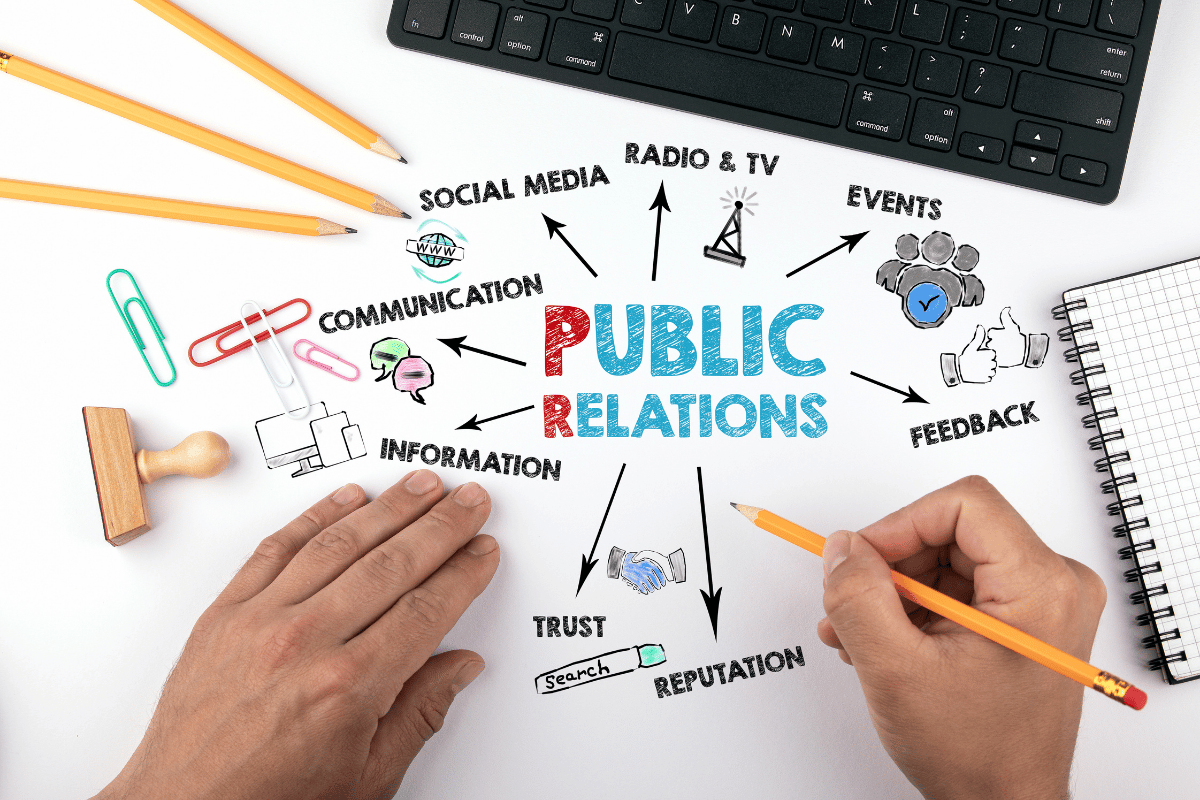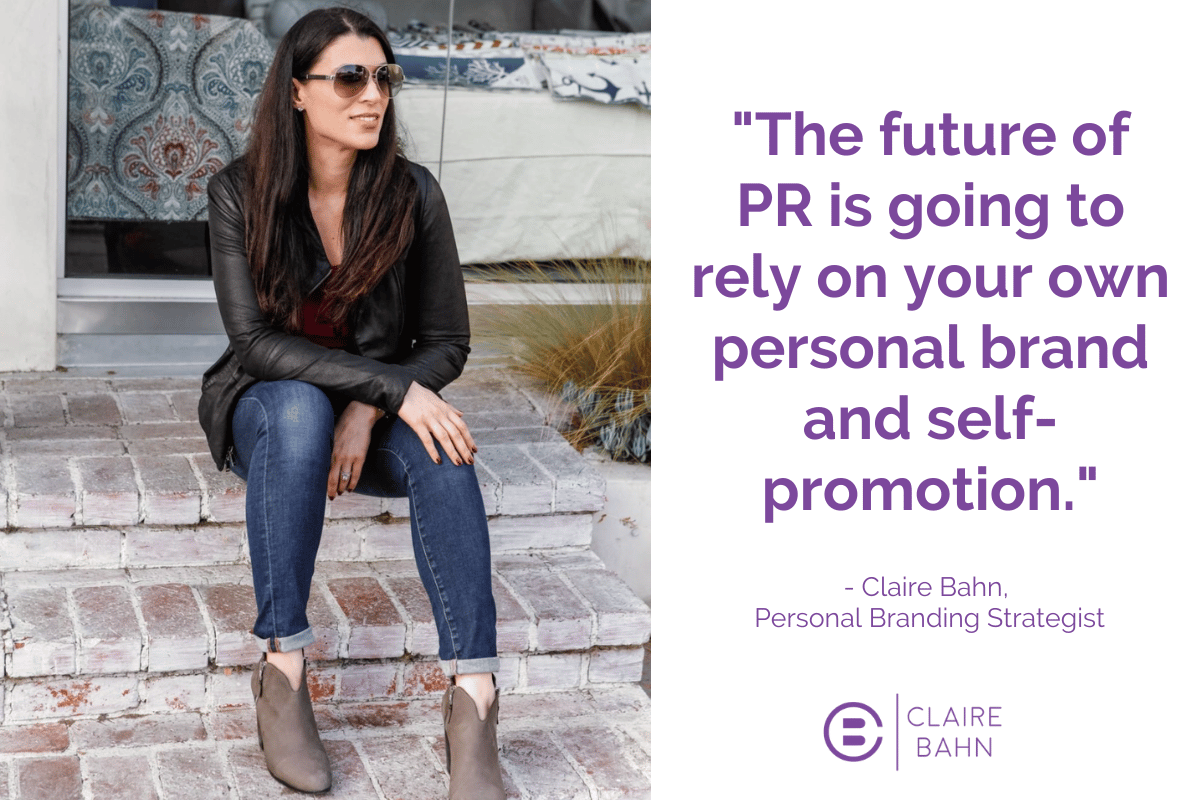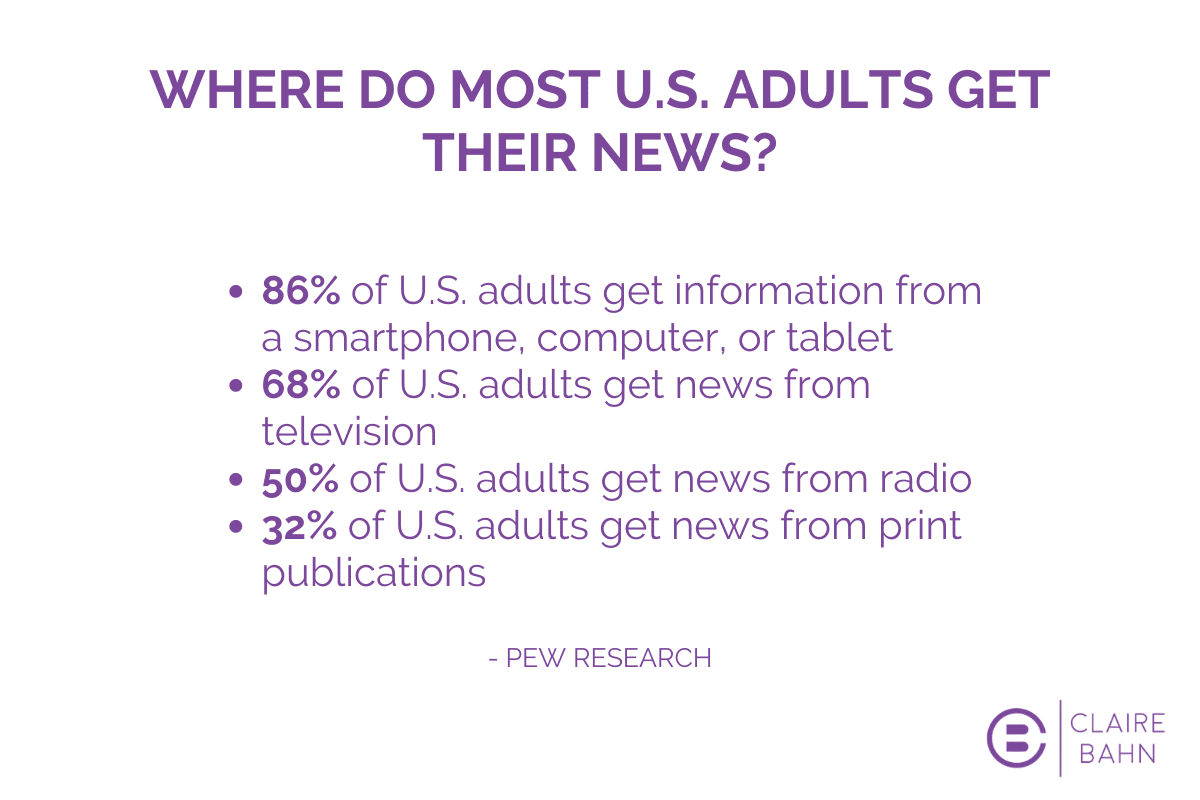Here’s what a PR agency isn’t going to tell you: the future of PR is going to rely on your own personal brand and self-promotion.
And I, for one, am so glad.
For some of you, the concept of public relations in 2021 might be almost unrecognizable. Social media influencers are getting press features in Forbes, and people recording their lives with their iPhones are becoming household names.
In this new age of digital media, your personal brand is what gets you in the press. Not your company, product, or service.
You.
For a while, I was paying a PR firm (this was years ago) to help get my name out there. Back then, I wanted to use PR for marketing purposes to get features in magazines or the local news. I filled out endless story ideas and pitch letters— only to get very few interviews or mentions.
It wasn’t cheap, either. I can’t remember exactly how much the monthly price was. I did have some friends who would pay their PR agency upwards of $10K a month to pitch them.
A year later, and they never got a single interview.
Can we chalk this up to a lousy PR firm? Maybe. The fact is, today, we live in a fast-paced and digital environment. It’s no longer adequate to wait for a PR firm to connect you to the “right people” to get some recognition.
Instead of waiting to get noticed, I created a brand around my own stories, experiences, and expertise. And now I have press coming to me.
RELATED: THE GUIDE ON HOW TO BECOME FAMOUS ON SOCIAL MEDIA
PR vs. Marketing
Is there a difference in PR and marketing strategies?
Traditionally, yes. PR and marketing used to be two separate commodities for businesses.
Marketing is when we actively spread the word about our company to generate sales. This typically starts with brand logos and mission statements, followed by rigorous promotion directed towards ideal customers.
PR, or public relations, is “a strategic communication process that builds mutually beneficial relationships between organizations and their publics.” That’s a direct definition from The Public Relations Society of America (PRSA).
In other words, a PR firm’s goal is to help CEOs build a professional and likable persona to attract customers, key stakeholders, and investors to their company.
In today’s market, there is no PR vs. marketing. That’s because PR and personal branding have melded together to create a new wave of marketing where all you need is an internet connection and your cell phone.
How Public Relations is Changing in 2021

When it comes to marketing in 2021, it’s not just about selling your product or service. In fact, I would argue that it’s first and foremost about building a relationship with your audience.
There’s that word again: relationship.
The benefit of having a personal brand is having the ability to cultivate relationships with your audience. You can’t do that with a company logo.
The good news? You no longer need to hire an expensive PR agency to build these public relations. Your personal brand helps cultivate your public perception because you can have a direct relationship with them. Videos help your audience see and get to know you, and long-form content allows them to see you’re an expert in your field.
Suffice to say that social media and traditional PR have merged together to allow the everyday business owner to create their own success stories. All it takes is posting consistently, providing value, and engaging with your online audience.
That being said, there’s only so much you can achieve with a social media following. You still need to branch out of your bubble and get press features or guest spots.
The Future of PR: Top 3 Public Relations Trends in 2021

Let’s face it; nobody wants you to be their podcast guest or interview you for Forbes if they can’t figure out who you are. You might be well known within your company, but has anyone else in your industry heard of you?
If the answer is no, that’s because you haven’t caught up with modern marketing (or modern PR). I’m willing to bet you’re not posting on social media. You probably don’t have a blog, and you’ve never even thought about creating video content on your expertise.
Unfortunately, if you want to have a relationship with the public, you have to be willing to display your public persona. Nobody cares about the company brand anymore. They want to know the CEO— the mastermind behind the company. Think Elon Musk or Marcus Lemonis.
This brings me to my first prediction for the future of PR: the celebrity CEO.
1. The Celebrity CEO
If I’ve said it once, I’ve said it a million times: people want to hear from other people, not company brands.
This market demands CEOs to be present online. The public wants to hear about Jeff Bezos’s hardships before becoming the richest man in the world. They want to hear from small business owners who create multiple six-figure businesses with $40 in their bank account.
These stories are what people want to hear because if someone else can do it, then they can, too.
The future of PR relies on the company CEO to be the face of their business. So when you map out your marketing plan to generate sales, make sure that plan includes you personally filming videos, writing blogs geared towards your target audience, and creating captions divulging your triumphs (and downfalls).
2. Mainstream Media is Out
Another thing that you may not have guessed about this new age of public relations is how little newspapers and magazine features do for your recognition.
As of 2021, more people get their news from online devices instead of mainstream media.
- 86% of U.S. adults get information from a smartphone, computer, or tablet
- 68% of U.S. adults get news from television
- 50% of U.S. adults get news from radio
- 32% of U.S. adults get news from print publications
This means that industry leaders and up-and-coming CEOs should focus on getting press features in blogs, podcasts, and YouTube channels.
Half of all U.S. households (that’s right— 50%) tune into podcasts, which is about 60 million homes. And with over 2 million podcasts to choose from, there are sure to be quite a few where your expertise is highly valuable to their listeners.
In terms of turning a profit from these features, “61% of people say their purchase decisions came from watching vlogs on YouTube.” And “On average, companies who blog produce 67% more leads per month.”

3. Reputation Management
If you’ve consumed any of my content before this, you know that the key to a thriving (personal) brand is creating content consistently.
This is easier said than done.
Besides time management, what happens if one of your posts goes viral?
Based on my experience, two things will happen when your public image starts spreading all over the internet:
- Your social media recognition (and follower count) grows.
- You’ll receive a slew of negative comments.
Having a sudden influx of public attention is a wild card: it can be really good or really, really bad.
Because the future of PR relies on your personal brand, you need to be proactive about maintaining the integrity of your name. You either have to consistently stay on top of your comments and news articles made about you, or you need to hire a team to manage your online presence and your reputation.
Executives and entrepreneurs are at the point where they need what amounts to a “talent agent” (like Hollywood celebrities have) that manages all aspects of their outward personas.
This is exactly the service I provide for CEOs. Not only can we build your “celebrity” to attract your target market, but we help you gain the authority, trust, and influence necessary to succeed.
How To Get Media Coverage
Now, if you’re wondering how to get media coverage for your business on your own, it’s pretty straightforward.
Here are 3 steps I took to take control of my personal brand and get my name out there.
Step 1: Define Your Personal Brand
The most fundamental aspect of your personal brand is crafting your personal brand message.
It’s similar to a company mission statement, except a lot more personal.
This is the image people will come to know you by; are you funny, informative, outgoing, relaxed? What image and what message do you want to be associated with your personal brand?
I always recommend being a positive reinforcement for your target audience. For example, I like to present myself as someone who tells it like it is. I’m not someone who gives motivational pep talks or tells you how easy it is to market your personal brand (because it not easy).
However, I make sure that I provide helpful resources (like this blog and my videos) to help everyone— whether you’re a brand new startup founder or a million-dollar CEO.
Step 2: Syndicate Your Content
Speaking of helpful resources, a crucial part of starting a relationship with the public is to produce content.
We all relied on PR agencies back in the day because they were the only ones who could find people to create articles or news segments around our company.
Now you can produce and syndicate your content much more effectively and use it to leverage yourself into the public arena. It’s just a matter of your own determination and self-promotion.
You need to be providing valuable — and often free — content. This means posting on your favorite social media platforms, creating free masterclasses, or simply writing blogs like this one. Stop hiding your knowledge behind a paywall before you’ve built a relationship with the public. You have to prove yourself first so that your audience will like, know, and trust you.
Step 3: Pitch Yourself
Just because we can talk to an audience directly via social media doesn’t mean that press features don’t have their place.
But before you think about getting your full-length feature on Entrepreneur.com, you need to understand what type of person journalists are looking to interview.
The public wants authenticity, which means the people behind the press are looking for “real” entrepreneurs to interview. You don’t have to build a vast social media following to look interesting, either.
Even if you do happen to have a large following, having your name in high-authority publications helps you reach out of your current sphere of influence. This is the only way to build your “celebrity” CEO status faster and more effectively than with social media alone.
So what will catch a journalists’ attention? Stories, valuable content, and consistency. Pretty much everything that goes into your personal brand.
If you want to know how to pitch to podcast hosts or journalists, here are some blogs that will come in handy:
-
How Being a Podcast Guest Elevates Your Personal Brand
-
What is Omnichannel Marketing?
-
How To Become an Industry Leader
-
How To Build a Reputation with Your Online Presence
Conclusion
When it comes to being a CEO or thought leader, you should be marketing your personal brand. By maintaining a translucent persona with the public, you can easily build your audience, get featured by the press, and scale your revenue.
If creating content and pitching to the media on your own sounds like a bit too much to handle, I’m here to help! I built my Personal Brand Concierge Program for high-achieving entrepreneurs, investors, founders, and executives just like you.



